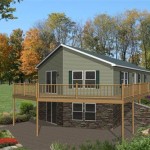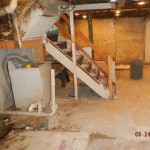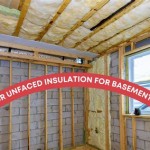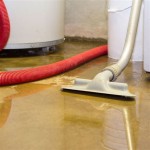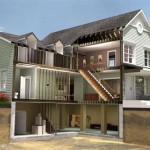What Is The Best Floor Covering For A Concrete Basement Wall?
Choosing the right floor covering for a basement with concrete walls requires careful consideration. Unlike above-ground floors, basements are susceptible to moisture issues, temperature fluctuations, and potential for flooding. Selecting an inappropriate material can lead to mold growth, structural damage, and an uncomfortable living space. The 'best' floor covering is subjective and depends on specific basement conditions, budget, desired aesthetics, and intended use of the space.
Before installing any floor covering, it is crucial to address any existing moisture problems. This may involve improving exterior drainage, sealing cracks in the foundation, installing a sump pump, or applying a waterproof sealant to the concrete walls and floor. Ignoring moisture issues will inevitably lead to problems, regardless of the floor covering chosen.
Understanding Basement Moisture Challenges
Concrete is a porous material, which means it allows moisture to pass through it. This moisture can come from several sources: groundwater seeping through the foundation, condensation forming on the cool concrete surface, or even spills and leaks within the basement itself. Proper drainage and ventilation are fundamental to mitigating these issues.
Hydrostatic pressure, the force exerted by groundwater against the foundation, can drive moisture through even seemingly solid concrete. This is especially prevalent in areas with high water tables or poor soil drainage. Water vapor transmission (WVT) refers to the rate at which moisture passes through a material. Basement floor coverings must be selected with consideration for WVT to prevent moisture buildup underneath, which can lead to mold and mildew growth.
Temperature fluctuations in basements can also contribute to moisture problems. Warm, humid air can condense on the cool concrete surface, creating a damp environment. This is particularly common during the summer months when the temperature difference between the basement and the outside air is significant.
Addressing these moisture challenges proactively is the most important step in preparing a basement for any type of floor covering. Without proper mitigation, even the most waterproof materials can fail over time.
Exploring Suitable Floor Covering Options
Several floor covering options are well-suited for concrete basement floors, each offering different advantages and disadvantages. These include: epoxy coatings, engineered wood flooring, luxury vinyl flooring, tile, and specialized subfloor systems.
Epoxy Coatings: Epoxy is a durable, seamless, and waterproof coating that bonds directly to the concrete surface. It is resistant to stains, chemicals, and abrasion, making it a good choice for high-traffic areas or workshops. Epoxy coatings are available in a variety of colors and finishes, allowing for customization. However, epoxy can be prone to cracking if the concrete underneath is not properly prepared or if the concrete shifts over time. It also offers little in the way of insulation or sound dampening.
Engineered Wood Flooring: Engineered wood is a layered product consisting of a thin veneer of real wood bonded to a plywood or composite core. It is more stable than solid hardwood and less susceptible to warping or cupping in humid environments. Engineered wood can be a good option for adding warmth and aesthetic appeal to a basement, but it's crucial to choose a product specifically designed for below-grade installation. A moisture barrier must be installed beneath the flooring to protect it from moisture migration. Solid hardwood flooring is generally not recommended for basements due to its susceptibility to moisture damage.
Luxury Vinyl Flooring (LVF): LVF is a synthetic flooring material that mimics the look of wood, stone, or tile. It is waterproof, durable, and easy to install. LVF is available in a variety of styles and thicknesses, including planks, tiles, and sheets. It is a popular choice for basements due to its resistance to moisture and its relatively low cost. Some LVF products also incorporate a padded underlayment for added comfort and sound insulation. When selecting LVF, it's important to choose a product with a good wear layer to resist scratches and dents.
Tile: Ceramic or porcelain tile is another excellent option for basement floors. Tile is waterproof, durable, and easy to clean. It is also resistant to stains and scratches. Tile is available in a wide range of styles, colors, and sizes, allowing for a variety of design options. However, tile can be cold and hard underfoot, so it is often paired with radiant heating for added comfort. Proper installation is crucial to prevent cracking or water damage. Consider using a flexible mortar to accommodate any slight movement in the concrete slab.
Specialized Subfloor Systems: These systems typically consist of interlocking plastic tiles or panels that create a raised air gap between the concrete floor and the finished floor covering. This air gap allows for ventilation and helps to prevent moisture buildup. Specialized subfloor systems can be used with a variety of floor coverings, including carpet, laminate, and engineered wood. They also provide added insulation and cushioning. While they may add to the overall cost, they significantly reduce the risk of moisture-related problems.
Key Considerations for Choosing a Floor Covering
Several factors should be considered when selecting the best floor covering for a concrete basement wall. These include moisture resistance, budget, intended use of the space, aesthetic preferences, and ease of installation.
Moisture Resistance: As previously emphasized, moisture is the primary concern in basements. Selecting a floor covering that is resistant to water damage and mold growth is crucial. Materials like epoxy, LVF, and tile are generally good choices in this regard. Engineered wood can be suitable if installed with a proper moisture barrier and if the basement is relatively dry.
Budget: The cost of different floor coverings can vary widely. Epoxy coatings and specialized subfloor systems can be more expensive than LVF or carpet. Consider the total cost of the project, including the cost of materials, installation, and any necessary preparation work. Setting a budget upfront will help narrow down the options.
Intended Use of the Space: The intended use of the basement will influence the choice of floor covering. For example, if the basement is being used as a home gym, a durable and impact-resistant floor covering like epoxy or rubber flooring would be a good choice. If the basement is being used as a family room, a more comfortable and aesthetically pleasing option like carpet or engineered wood might be preferred.
Aesthetic Preferences: The aesthetic appeal of the floor covering is also an important consideration. Choose a material that complements the overall design of the basement and that reflects personal style. Consider the color, texture, and pattern of the floor covering.
Ease of Installation: The ease of installation can also be a factor, especially for those who plan to install the floor covering themselves. Some materials, like LVF, are relatively easy to install, while others, like tile, require more skill and experience. Consider the time and effort required for installation when making a decision.
In conclusion, the selection of the ideal floor covering for a basement with concrete walls is a multifaceted process. Careful assessment of moisture levels, budgetary constraints, intended use of the space, and aesthetic desires are paramount. Prioritizing moisture mitigation strategies ensures the longevity and performance of any chosen flooring material. The options discussed offer various benefits, and a thoughtful approach will result in a comfortable, functional, and visually appealing basement environment.

The Best Floors To Have Installed Onto Concrete Empire Today Blog

Best Basement Flooring The Warmest Floor Covering Is Cork

What Are The Best Flooring For Basement In Homes

Top Basement Wall Ideas For Homeowners Trusscore

Stylish Solutions Covering Unfinished Basement Walls Csg Renovation

Best Basement Flooring Ideas Options Over Concrete

Smart Ideas For Your Basement Flooring

Stained Concrete Basement Floor Ideas

10 Ways To Cover Concrete Walls In A Basement Finish

Best Budget Basement Flooring Ideas
See Also


